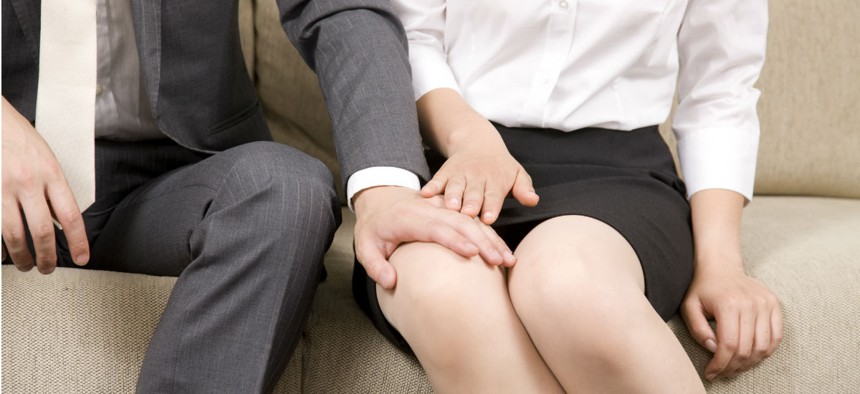Nearly One in Five Female Feds Say They Have Experienced Recent Workplace Sexual Harassment
One percent of feds said they have been raped or assaulted at work in last two years, survey finds.
Nearly one in five female federal employees say they have experienced sexual harassment in the workplace within the last two years, according to a recent survey, a figure that has dropped significantly over the last two decades.
Women were three times as likely to have experienced sexual harassment as men, according to the first survey of its kind from the Merit Systems Protection Board since 1994. In that year, 44 percent of women said they had experienced sexual harassment in the preceding two years, while 19 percent of men said the same. In 2016, the year in which MSPB conducted the most recent survey, those figures were 18 percent and 6 percent, respectively.
Female federal employees were most likely to have endured “unwelcome invasion of personal space,” with 12 percent of respondents indicating that had occurred. That is down from 24 percent in 1994. In that year, “unwelcome sexual teasing, jokes, comments or questions” was the most frequent form of harassment, with 37 percent of women saying they had experienced it. That dropped to 9 percent in 2016.
One percent of federal employees, both male and female, said they had experienced “actual or attempted rape or sexual assault” in the workplace in the previous two years. The same percentage said they had experienced “pressure for sexual favors,” while 3 percent of women—and 1 percent of men—said they had endured “pressure for dates.”
“Although progress has clearly been made in reducing the frequency of sexual harassment,” MSPB said in a newsletter announcing its findings, “agencies need to continue working to educate employees about their rights and responsibilities in terms of their conduct in the workplace.”
MSPB issued the results as part of its Merit Principles Survey in advance of an upcoming report containing the full data. The upcoming report will describe employees’ views on how agencies prevent and address sexual harassment, “risk factors” that increase the likelihood of exposure to harassment and strategies for rooting it out.
Federal employees appear to face less sexual harassment than their private sector counterparts. In a 2013 YouGov/Huffington Post survey, 13 percent of respondents said they had been sexually harassed by a superior, while 19 percent said the same of a non-superior. A 2015 Cosmopolitan survey found one in three women ages 18-34 had been sexually harassed at work. That survey polled 2,235 full and part-time female employees, while the Huffington Post survey polled 1,000 adults and had a margin of error of 4.2 percent.
MSPB noted the recent string of allegations against federal employees for sexual harassment.
“In light of recent allegations of sexual harassment and misconduct in several federal agencies,” MSPB said, “a casual observer might think that many or all federal workplaces are unprofessional and unwelcoming, especially for women.”
The National Park Service has faced a litany of sexual harassment allegations, leading to multiple congressional hearings and promises for cultural changes from agency leadership. Lawmakers recently investigated claims of repeated sexual harassment at a Customs and Border Protection outpost and the Justice Department earlier this year was found to have paid out bonuses to 1,400 employees under investigation or being disciplined for cases involving stalking, peeping, inappropriate touching and inappropriate relationships with subordinates.








